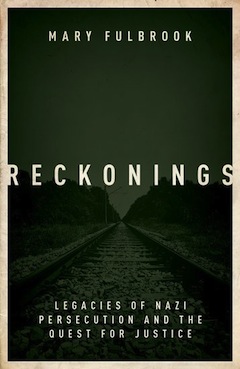The theme of Reckonings: Legacies of Nazi Persecution and the Quest for Justice (Oxford University Press, 2018), the new book by eminent English historian Mary Fulbrook, is justice. Or, rather, injustice, as she exposes how ex-Nazi perpetrators, and bystanders to their murderous policies, have evaded (and continue to evade) due process and acknowledgment of moral responsibility for their (in)actions.
Every level of strategy open to these criminals and cowards is exposed in Reckonings. Fulbrook reveals all the political, psychological, pragmatic, legal (and illegal), scapegoating, self-serving, self-exculpatory, “we were victims too”-type excuses by which the morally corrupt and unconscionable avoid due process and personal liability.
Fulbrook rightly says, at the end of Reckonings, “there can be no answer to the questions of why and how cruelty on this scale was possible.” So, what, she asks, can the “honest” historian do? Her answer sums up the well-realized objective of this magisterial new book: “Historians can clarify patterns of involvement in and responsibility for Nazi persecution and explore the implications both for those who lived through it and those who came after.”
Nazi criminality is, of course, a hugely complex historical issue, but Fulbrook’s strategy is simple and direct: it is to “reconstruct the ways in which wider social and political developments intersected with individual lives” such that “large numbers of people were mobilized in service of a murderous cause.”
 Reckonings is rich with such exploration of “individual lives,” both of persecutors and bystanders, and it rings also with the agonizing accounts of dozens of victims, among whom Fulbrook gives frequent and welcome voice to the rarely referenced persecuted sub-groups of homosexuals, and victims of Nazi euthanasia policies.
Reckonings is rich with such exploration of “individual lives,” both of persecutors and bystanders, and it rings also with the agonizing accounts of dozens of victims, among whom Fulbrook gives frequent and welcome voice to the rarely referenced persecuted sub-groups of homosexuals, and victims of Nazi euthanasia policies.
Fulbrook’s central focus is, however, justice: justice failed and justice delayed, delayed by silence, by endless rationalization, by foot-dragging, by the pollution of the legal system by former Nazis (described as “themselves swimming in a sea of guilt”) and, no less disturbing, by the pragmatics of (primarily American) Cold War strategists, anxious not to offend a potential ally against the Soviet Union.
Reckonings is unusual history in its welcome lack of “normal” arm’s-length objectivity: Fulbrook is uncompromisingly fierce in her condemnation of those who were responsible for this “maelstrom of murder.” Throughout the book, she remains directly and openly angry, and determined to “nail down” these murderous ignoramuses, just-following-orders immoralists and “I knew nothing” liars. One feels the heat of Fulbrook’s grit and determination: each page rings out with a loud, “they will not get away with this as long as I can help it.”
Reckonings is divided into three parts. Part One, the most “traditional” part of the book, explores the various sites of this “maelstrom of murder,” beginning with Auschwitz, but moving carefully beyond, to less and less better-known killing centres, especially in southern Poland – where there were many forgotten violent “microcosms of violence,” as she calls them.
Part Two is, as Fulbrook’s title suggests, the heart of the book: here, the focus shifts to the attempts to bring perpetrators (both men and women) to justice. She lays out the proceedings of the various major trials – Auschwitz, Sobibor, Belzec, Dachau, Hadamar, the Einsatzgruppen trial, etc., right up to the present – but also includes trials relating to perpetrators of euthanasia and other crimes. She outlines, in fascinating detail, the differences between the ways that East and West Germany approached bringing Nazis to justice: the former being famously more diligent than the latter, leading to a flood of ex-Nazis to the more “tolerant” West in the early years after the war. This flood included all the euthanasia personnel, who left their families behind in the GDR to escape justice. (The West accepted the “just following orders” defence; the East did not. About 400,000 people benefited from this and similar lax standards in the West.)
The third part, “Memories,” is about how survivors remember, and how Nazis forget. It combines a plangent exploration of the personal experiences of individuals living around the world who have survived persecution – most of whom have never received compensation or recognition – with accounts of how perpetrators and their minions managed (and still manage) to cover their tracks, and how this evasion affects their children and grandchildren.
The most memorable chapter of this final part is called “The Commemoration of Shame.” She notes here how the “shame” of the perpetrators is almost always buried in the sea of guilt-ridden commemoration throughout Germany, as is the pain of forced and slave labourers, the acknowledgement of which would still have legal (compensation) ramifications for German industry. Fulbrook also notes here that it wasn’t until 2014 that the first memorial appeared for the victims of Nazi euthanasia policies.
Reckonings ends in despair. “So few perpetrators brought to account; so little justice.”
Ian Kershaw has written that “the road to Auschwitz was built by hate but paved by indifference.” Fulbrook reveals that the road from Auschwitz is not a whit less hateful and, certainly, no less met by indifference.
Graham Forst, PhD, taught literature and philosophy at Capilano University until his retirement and now teaches in the continuing education department at Simon Fraser University. From 1975 to 2010, he co-chaired the symposium committee of the Vancouver Holocaust Education Centre.

